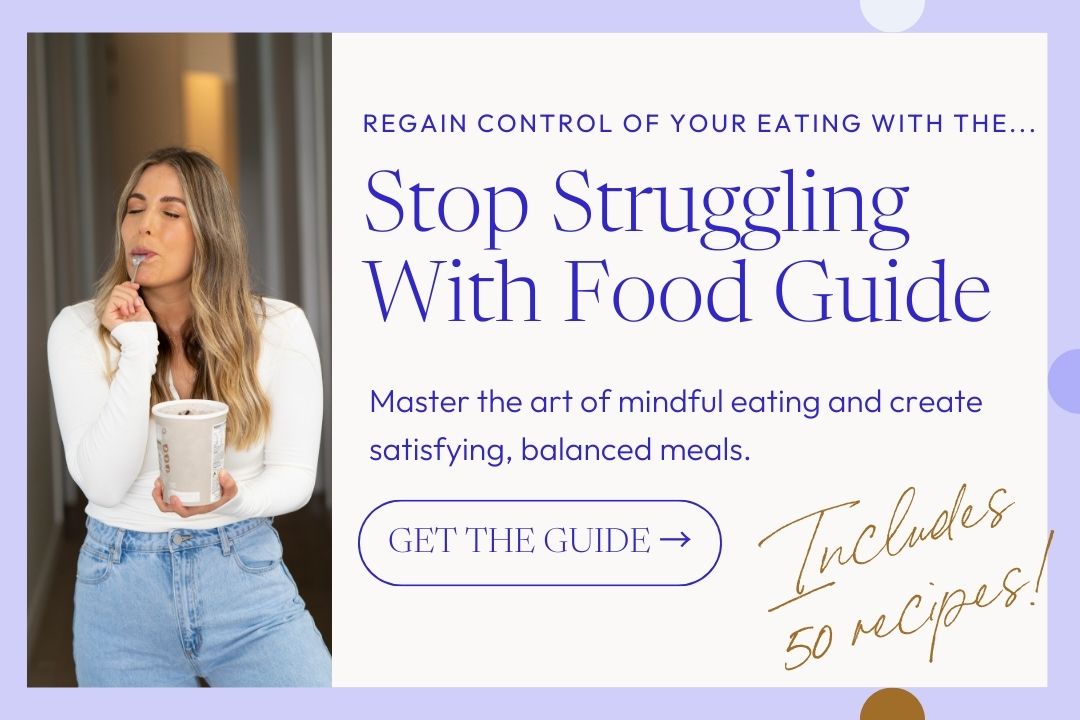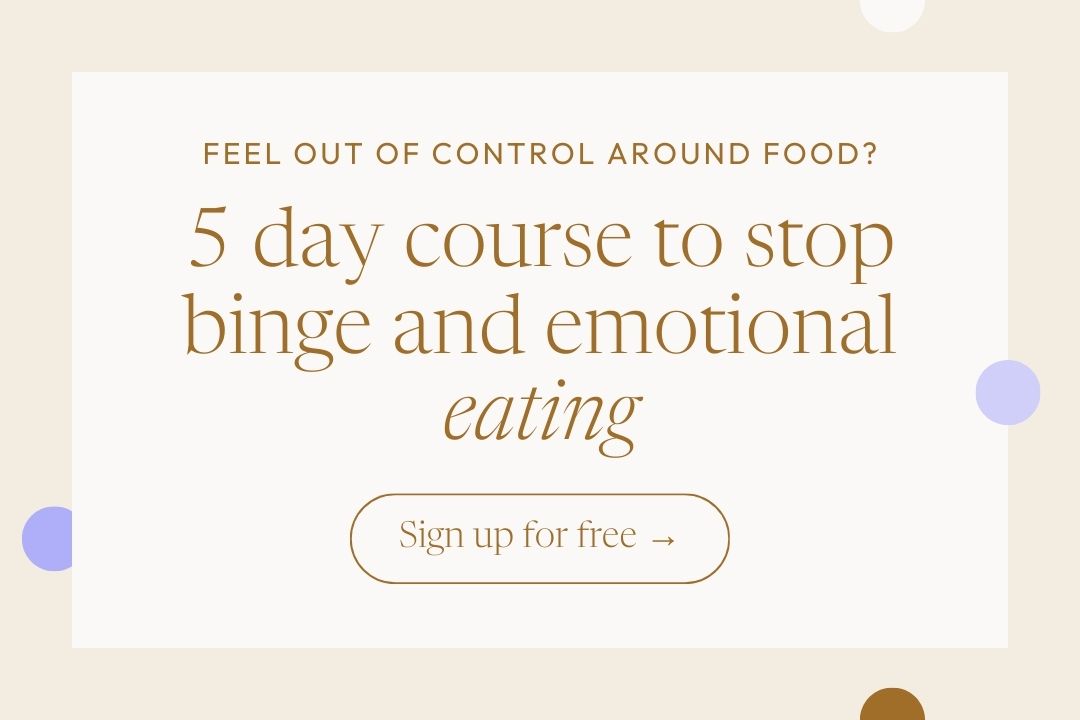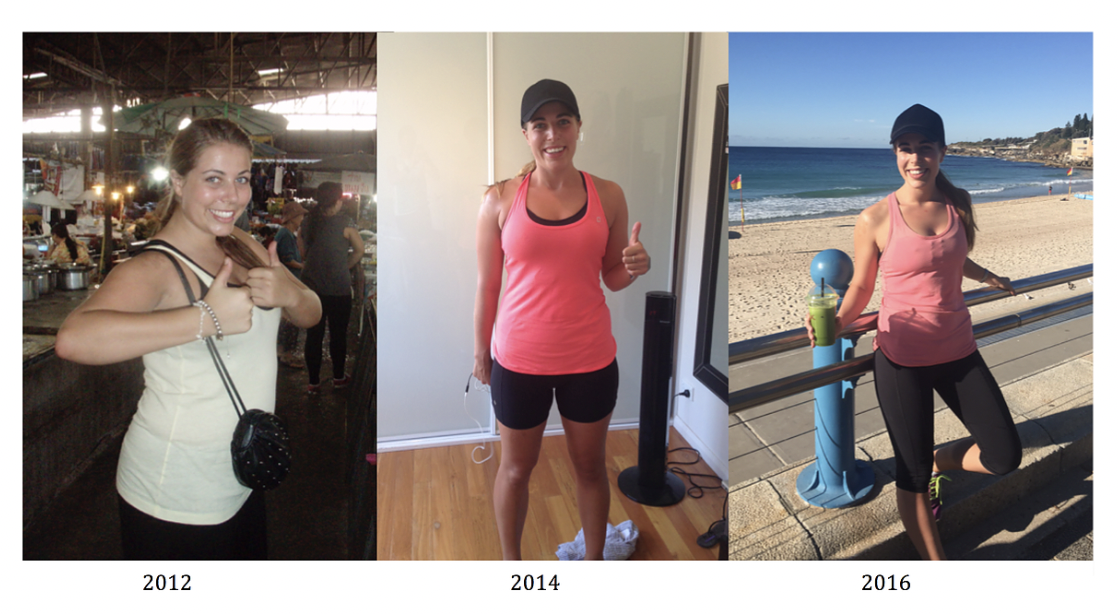Intuitive eating is about getting back that very deeply intelligent part of you that knows exactly how to best feed yourself. But we know that silly diet rules can make intuitive eating feel almost impossible. Especially if you still have a strong desire to lose weight.
So, what should you do if you don’t want to go back to diet land- but still want to lose weight? Is this even possible with intuitive eating?
Before we get into it, let me get something clear. I’m not anti-weight loss. I get it. Carrying extra weight feels hard. It can impact your joints, energy and confidence. So it’s only natural that you still have a strong desire to lose weight for better quality of life. But chasing weight loss for the sake of weight loss? That’s very crappy motivation.
Why diets are the problem – not the solution
From the moment you were born, you knew how much food your body needed to get enough energy. But as time went on, things shifted. Pesky diet rules and unwanted nutrition advice made intuitive eating almost impossible.
Here’s the thing about diets. You try to be good, maybe just for a day. Then, bam! An emotional rollercoaster hits. Suddenly you’re convinced you can eat an entire block of chocolate, tub of ice-cream and bag of chips and ‘be better’ tomorrow.
It’s like this switch flips in your brain. And diets, well, they mess with your head. They set you up for failure but make you believe it’s all on you. Then, you not only dislike your body physically, but feel guilty and ashamed. It’s a never-ending blame game. And that’s why I’m anti-diets.
Many studies also reveal a tough reality: around 95% of diets fail in the long run. This means that after two to five years, people gain back the weight they lost. But that’s not even the worst part. They often end up gaining even more. Looking at the effectiveness of weight loss diets, research suggests an alarming failure rate of roughly 98 to 99%.
Imagine relying on a parachute that only opens 2% of the time – it’s clear we need a better approach.

“I need to lose weight because I’m overweight”
Being underweight increases the risk of premature death more than being overweight. Surprisingly, we often overlook the dangers of being underweight due to weight stigma. And having a bit more weight, especially for older people, may act as a protective buffer during illness.
With that said, it’s important to recognise when excess weight causes health issues like type 2 diabetes. This is when it can become a health problem. But striking a balance for overall well-being is key.
The problem is that if you go on a weight loss diet, it’s probably not going to lead to sustained weight loss. Sure, you would lose weight in the short-term. But fundamentally, you’re not fixing the problem, which is your mindset and relationship with food.
Hating your body and feeling like you’re the wrong weight is such powerful motivation that you’ll do almost anything. You will take extreme action. And it feels so important that you take action quickly.
This impatience, and the desire to get rid of this weight, can propel you into doing really extreme, unhealthy, unsustainable things. And justifying it in a way that is totally unhelpful.

So, can you lose weight with intuitive eating?
Perhaps after 1256 dieting attempts, you decided to give intuitive eating a go. Thinking this could be the golden ticket to weight loss. But here’s what you need to know.
Intuitive eating is all about changing your mindset about food. Learning how to eat normally again after years of restricting food and eating by the clock. Intuitive eating isn’t another diet filled with silly rules. It’s about learning how to know when you’ve eaten enough and when you need to eat more. It’s not based on the words of an influencer or diet guru, but by listening to the signals that your smart body is sending you.
To answer the question: yes, you might lose weight with intuitive eating. But you might not lose weight with intuitive eating. Weight loss isn’t the goal. The real benefit is feeling normal and relaxed around food. Creating a healthy relationship with your body. No more counting calories. Freedom from food rules. Which is why it’s crucial to focus on your health and relationship with food, not weight loss.

Intuitive eating is not a weight loss protocol
If you’re trying to pursue weight loss at the same time you’re doing intuitive eating, you’re going to fail at intuitive eating. And you’ll probably feel like intuitive eating is not working for you.
Here’s the thing. If you feel obsessed with food and can’t stop thinking about anything else, you really have a relationship with food problem. You don’t have a weight problem.
We’ve been told our whole lives that your weight is the problem and by focusing on it, you’re going to solve it. But in reality, based on all the research that we have around it, this makes the situation a whole lot worse.
I know this is not a convenient truth because you want a quick fix. Something that’s really simple. But as a dietitian who’s helped thousands of people stop binge and emotional eating, here’s my advice: focus on your health and things that feel enjoyable. Accept the slowness of it. And you really may lose weight. Many people do.
But weight loss isn’t the big win here. You see, once you eat intuitively, you have so much more headspace for the things that are most important in life. You stop saying no to plans because you’re worried how many calories are in pizza or ice-cream. And this is where you start to count memories, over calories. It’s powerful stuff. Especially if you want to live a healthy, happy life that’s not constantly occupied by food thoughts.
Small habits that lead to big changes
I lost 20 kilograms over four years. Not by obsessing over the scale but by adding in healthy habits. It wasn’t your typical weight loss protocol. No weekly kilo targets, but a gradual 100-gram loss each week. Adding healthy habits, bit by bit, allowed my body to find its sweet spot. And gave me so much more confidence, headspace and freedom to ENJOY life. Yes, my weight has slightly shifted over the years. Especially after giving birth to two beautiful babies. But I never regained those 20 kilos, plus more.
We need to be doing things irrespective of how they’re going to impact our weight. Healthy habits don’t need to be hard and overwhelming. It can be as simple as walking to pick up your kids from school. Riding a bike to work. Getting to sleep half an hour earlier. Adding healthy fats, protein, slow burning carbs and a yummy dressing to salads to make it not only healthy, but also enjoyable.
I think we neglect a whole bunch of healthy habits because they don’t directly impact weight. And it misses the point. The point of doing healthy things is for the flow-on effects. It improves our quality of life. And zoning in on weight loss all the time can deter us from doing all these brilliant, healthy habits that accumulate and add up to something really grand and powerful.

Before you add in a healthy habit, ask yourself these 3 questions:
- Can I do this for the rest of my life?
- Does this help me become the person I want to be?
- If this didn’t impact my weight, would I still do it?
If the answer is yes- start doing this healthy habit. And when one habit starts to stick, slowly add more.
This is something I talk more about in my book Your Weight Is Not Problem. If you want to ditch diet culture BS and find real health (and self-love), I’d love for you to give it a read, or listen to.
Are you chasing weight loss for health or society standards?
Ever feel the pressure to meet beauty standards? The thin ideal can get mixed up with health. Instead, focus on doing healthy things and cut yourself some slack if your body doesn’t match the ideal. It’s about doing what feels good and letting go of that wished-for body.
Remember, intuitive eating is a journey. And focusing on weight loss makes losing weight a whole lot harder. You don’t always need to lose weight. Sometimes you do. But don’t confuse being thin with being healthy.
And if you’d love some non-BS recipes to eat for actual health and help you ditch dieting for good, check out Back to Basics. Try it free for 7-days. It’s health info but without the diet nonsense – pinky promise.
